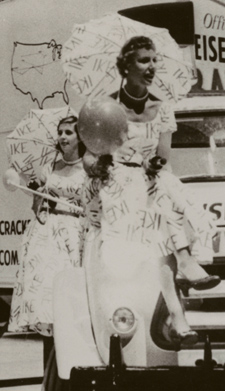
1952: Liking Ike
The 1950s was a decade of optimism and prosperity for American middle class voters. After the Great Depression and Second World War, the country felt buoyed by a strong economy and a sense of peace (at home, anyway). Although a former Democrat, Dwight D. Eisenhower was recruited by both parties, choosing to represent the Republican Party . Eisenhower’s campaign managers focused on his tremendous personal appeal as a war hero and downplayed his lack of political experience. His campaign slogan took advantage of his nickname; supporters declared “I Like Ike!” on every occasion. The “Ike” campaign took a moderate approach, stressing the importance of American family values as the cornerstone of the nation in its new role as protector of the free world. Eisenhower left it to his running mate, Richard M. Nixon of California, to attack the Democratic party candidate.
The Democratic Party did not nominate President Harry S. Truman, whose low approval rating forced him to step out of the running. Instead, they chose Adlai Stevenson, who used his considerable oratorical skills to focus on Cold War issues and on improved support for farmers. As a divorced man, however, Stevenson could not assail Eisenhower’s association with the nuclear American family. Democratic advisors chose instead to present him as a serious intellectual candidate devoted to the needs of special constituencies. Nixon’s attacks, combined with Senator Joseph McCarthy’s charges that Stevenson had promoted communism, kept the Democratic campaign on the defensive.
Stevenson for his part offered no remedy to the single most important campaign issue: the Korean War. Ten days before the election, “Ike” declared, “I shall go to Korea,” to settle the war himself. Ultimately, the “I Like Ike!” bandwagon was victorious, proving that his popularity and promise of peace significantly influenced the vote.